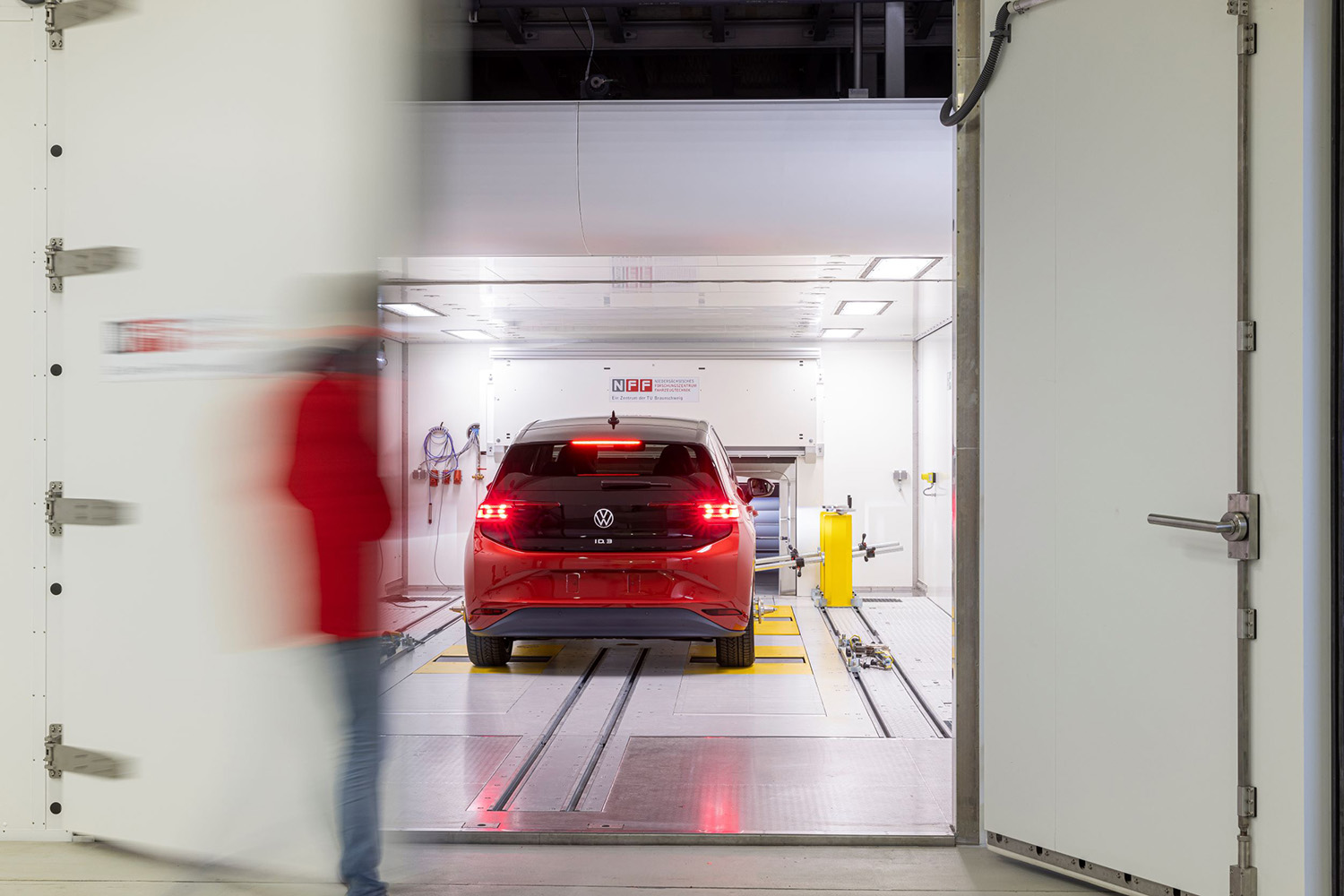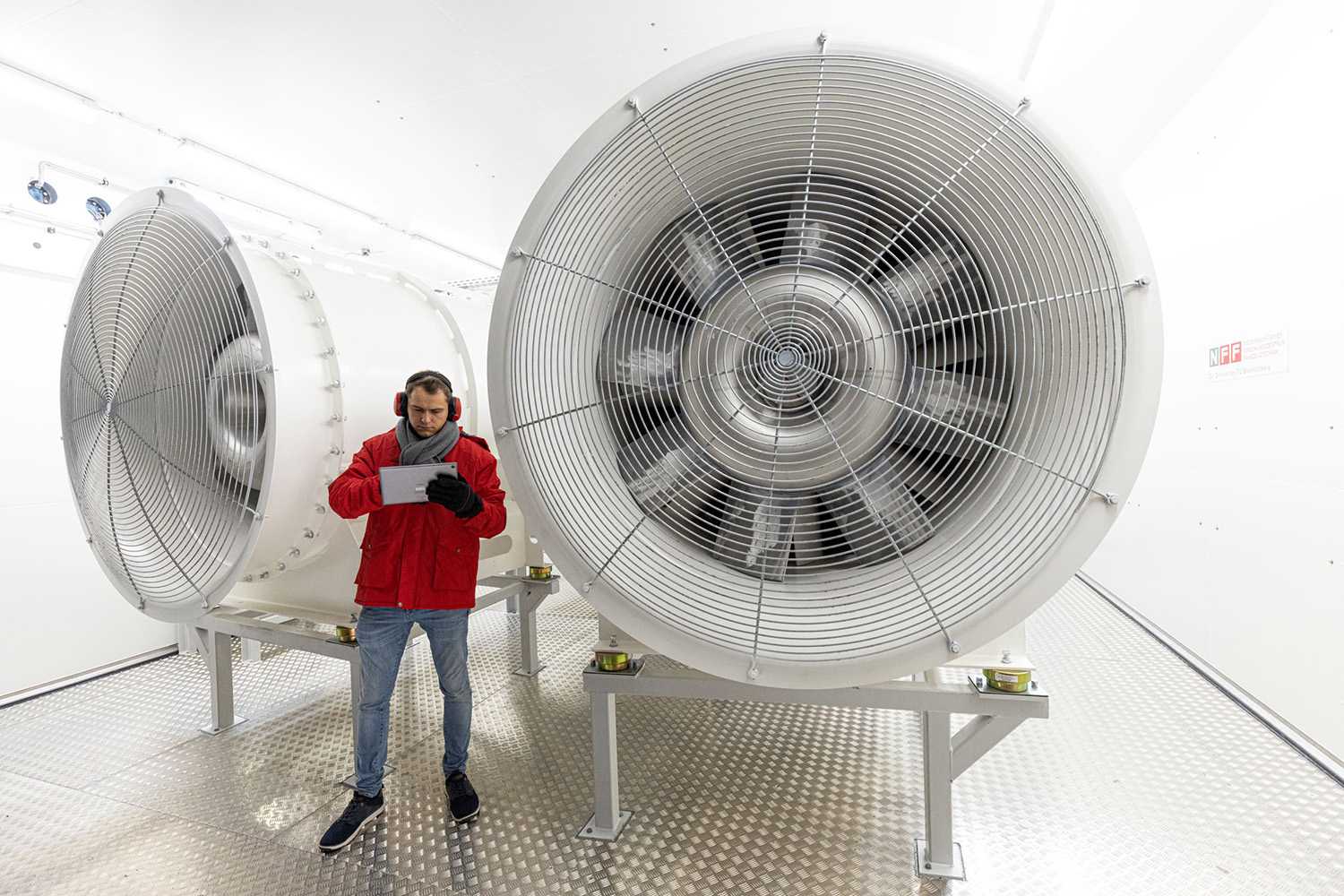Realistic automotive testing at low temperatures and extreme climatic conditions Introducing the new climatic AWD dynamometer at NFF
The Automotive Research Centre Niedersachsen (NFF) combines expertise from TU Braunschweig and external affiliates for its mobility research. It is a member of European and international networks, has close connections with businesses, and provides advice and support with regard to project acquisition and participation in large-scale funding projects. In addition, the NFF headquarters at the Braunschweig Research Airport are home to a complex infrastructure of large-scale equipment. Costing €4.9 million, the climatic dynamometer, recently inaugurated by the Minister of Science of Lower Saxony, is its largest investment to date. The test stand allows to measure vehicle performance based on a wide range of parameters, also under extreme ambient conditions.

View into the new climatic AWD dynamometer at NFF. Credits: NFF/André Walther
The recently installed and unveiled climatic AWD dynamometer at NFF, a major piece of equipment, was planned to be a part of the automotive research centre since its beginnings in order to complete the hands-on research roadmap. Following the planning phase and awarding of the contract, construction of the test stand began in the first quarter of 2020. The facility, which was ready to use after 18 months of installation work, is available to NFF affiliates for collaborative research since late 2021.
Test stand in an air flow and climate chamber
The system part-funded by the German Research Foundation (DFG) is an all-wheel drive dynamometer integrated in an air flow and climate chamber. With a total mechanical output of 800 kW, the individual wheel drives of the test stand rollers allow the analysis of all drivetrain topologies – in other words front-, rear- and all-wheel drive vehicles with any powertrain (electric, hybrid or conventional). At the same time, a realistic air flow is created around the vehicle at wind speeds of up to 150 km/h. Meanwhile, the integrated high-performance air-conditioning unit provides controlled ambient conditions for testing. The air temperature for the test stand can thus be precisely set at any level between -30° and +40° Celsius. The air humidity can be set in a range of up to 95% (relative humidity).
Three floors of state-of-the-art technology
The test stand facility extends over three floors: The test rollers and their drive units are housed in the basement, the vehicle test chamber is located on the ground floor while the air circulation fan and air-conditioning unit are on the first floor.
“The NFF’s climatic AWD dynamometer differs from other commonly used industrial systems in its realistic simulation of airflow around the vehicle. When required, we can adjust the height of the test chamber within a range of 2.25 and 2.75 metres to generate an underbody airflow, which is similar to the airflow while driving on the road,” says Gerrit Brandes, Head of Drivetrains and Transmission of the Institute of Automotive Engineering (IfF) at TU Braunschweig, who coordinated the construction of the NFF test bench together with Dr Gunther Alvermann (also IfF).

Part of the air-conditioning of the dynamometer at NFF: Recirculation and air conditioning technology on the upper floor. Credits: NFF/André Walther
Important for research on the thermal management of electric vehicles
It is necessary to have this kind of underbody flow together with a uniform flow on the front of the car in order to study the thermal effect on the traction batteries integrated into the underbody of most electric vehicles. “Thermal management is of particular importance in the case of innovative powertrains. Although electric powertrains are significantly more efficient than conventional drives, the waste heat they generate can be considerably more difficult to dissipate. In addition, temperature has a more extensive effect on the performance of batteries and fuel cells than on that of internal combustion engines. These environmental factors can now be investigated in detail in a reproducible testing environment,” Gerrit Brandes adds.
The cold-start behaviour of various drive systems is a relevant research topic, too. Portable emissions measurement systems (PEMS) can be used to analyse the emissions of hybrid vehicles under controlled environmental conditions.
Thermal management is an aspect that is not only relevant for powertrains and their components, but also plays a significant role in operational safety, other functions of vehicles and the ambient comfort of vehicle occupants, meaning multiple institutes are using the NFF climatic AWD dynamometer.
